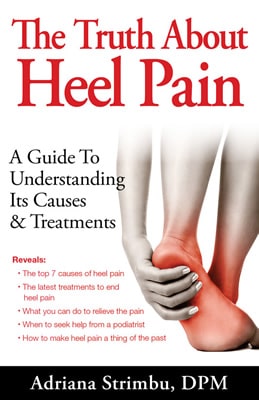
An inflammatory foot condition that commonly affects the heel may be plantar fasciitis. The plantar fascia is found on the sole of the foot and connects the heel to the toes. Overusing the foot or enduring an injury can cause this tendon to become torn or irritated, and plantar fasciitis may result. This condition can cause severe pain and discomfort, and it is often difficult to walk. The heel and lower back of the leg are affected by plantar fasciitis, and the pain may be worse in the morning after sleeping. Plantar fasciitis may be more prevalent among older people. The fat pad in the heel may not absorb as much shock as it once did and can become thinner. The additional shock may damage the plantar fascia, and the heel may become swollen and bruised. Additionally, people who are overweight, have diabetes, or have flat feet may be more susceptible to developing plantar fasciitis. Stretching the heel and calves may provide mild relief. This can be done by standing on a step while lowering the heel one at a time until a gentle stretch is felt. If you have heel pain, it is strongly suggested that you visit a podiatrist who can effectively diagnose and treat plantar fasciitis.
Plantar fasciitis is a common foot condition that is often caused by a strain injury. If you are experiencing heel pain or symptoms of plantar fasciitis, contact Adriana Strimbu, DPM from Complete Foot & Ankle Care. Our doctor can provide the care you need to keep you pain-free and on your feet.
What Is Plantar Fasciitis?
Plantar fasciitis is one of the most common causes of heel pain. The plantar fascia is a ligament that connects your heel to the front of your foot. When this ligament becomes inflamed, plantar fasciitis is the result. If you have plantar fasciitis you will have a stabbing pain that usually occurs with your first steps in the morning. As the day progresses and you walk around more, this pain will start to disappear, but it will return after long periods of standing or sitting.
What Causes Plantar Fasciitis?
- Excessive running
- Having high arches in your feet
- Other foot issues such as flat feet
- Pregnancy (due to the sudden weight gain)
- Being on your feet very often
There are some risk factors that may make you more likely to develop plantar fasciitis compared to others. The condition most commonly affects adults between the ages of 40 and 60. It also tends to affect people who are obese because the extra pounds result in extra stress being placed on the plantar fascia.
Prevention
- Take good care of your feet – Wear shoes that have good arch support and heel cushioning.
- Maintain a healthy weight
- If you are a runner, alternate running with other sports that won’t cause heel pain
There are a variety of treatment options available for plantar fasciitis along with the pain that accompanies it. Additionally, physical therapy is a very important component in the treatment process. It is important that you meet with your podiatrist to determine which treatment option is best for you.
If you have any questions, please feel free to contact our office located in Hallandale Beach, FL . We offer the newest diagnostic and treatment technologies for all your foot care needs.





